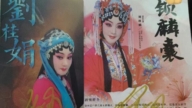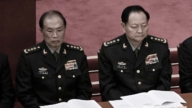【新唐人2012年1月26日讯】英国《金融时报》报导,北京政府急切希望在国际上树立良好形象,中国财团正向好莱坞进军,想在美国树立起中国的标志。但大陆导演张艺谋耗资6亿人民币打造的《金陵十三钗》,却没能踏进奥斯卡门槛。学者指出,大陆太多违反普世价值的禁令,使得作品很难得到世界的认可。
《金融时报》的一篇文章说,由中国大陆传媒大亨吴征为首的财团,正在向好莱坞进军,希望收购狮门影业电影公司,在美国娱乐界树立起中国的标志。文章认为,北京政府急切希望在国际上树立良好形象,这可能是投资者进军好莱坞的主要原因。
但张艺谋作品《金陵十三钗》,在最近奥斯卡最佳外语片竞争中却被淘汰出局,影片被批“只有性,没人性。”
中国文化评论家叶匡政认为,一个民族的创伤记忆,不用严肃的态度反思,用性或带有各种商业目地的各种手段来表现,是对人性的亵渎和对人性的不尊重。
叶匡政:“张艺谋的《金陵十三钗》是对整个中国关于南京大屠杀这种创伤记忆的一种伤害。所以他的电影在西方受到普遍贬低是一种正常的现象。”
清华大学美学教授、文化批评家肖鹰则认为,张艺谋模仿好莱坞大片10多年,只知道抄袭画面制作,不知从电影精神的深层借鉴和提升。
其实,张艺谋的电影以前并不是这样的。他执导的《活着》获得1994年第47届“戛纳电影节”评审团大奖和最佳男演员奖。但这部影片因为涉及政治因素,有对中共讽刺的意味,所以没有通过大陆的审查,至今没有在大陆公映。
叶匡政表示,张艺谋的《活着》被禁以后,他来了个大转向。
叶匡政:“他这几年中共的意识跟的比较紧,所以我觉得他已经丧失了对艺术的创作力和判断力。”
中国艺术研究院研究员吴祚来认为,现在的大陆电影人在哲学、价值观上都是欠缺的,只是为了追求市场,很难有艺术性和文化深度。
吴祚来:“那些资本的力量,他们以为只要是情色,全世界都会喜欢。其实并不是这样。没有价值追求,没有历史感,没有对人尊严的尊重,没有自由的思想,他这种东西很难得到实践的承认。”
叶匡正透露,前一段时间中国公布了电影界的13条禁令,民族问题、宗教问题、官员腐败、中国现代史等都不准反思,影响社会和谐的也不允许表现。
叶匡正:“无论电影也好、文化也好,各种艺术创作,只要给他空间、给他自由,他就自然而然有丰富的土壤。但是中国电影有大量的禁区,中国五十年代的反右、60年代的文革,那里有大量的故事素材,任何一个故事拍成电影都会震动世界。但是中共并不允许你触及他的历史。”
吴祚来也指出,国内审查太多,每个人写东西的时候,要考虑是不是违禁、是不是领导喜欢,能不能通过审查,甚至会不会有人来找麻烦。这种环境下,文化怎能获得发展?
新唐人记者秦雪、宋风、王明宇采访报导。
“Flowers of War” not recognized
Britain’s Financial Times reported, Beijing really wanted to
establish a good international image.
The Chinese media companies are trying to enter Hollywood
and establish the Chinese image in the U.S.
However, director Zhang Yimou’s film “Flowers of War” which
cost 600 million yuan ($94.7 million USD) was not even mentioned at the Oscars.
Scholars pointed out, there are too many restrictions in
China, making films hard to gain global acceptance.
An article by the Financial Times wrote, mainland Chinese
media mogul Wu Zheng and others are trying to enter Hollywood,
hoping to buy out Lions Gate Films and establish a Chinese
image in the U.S entertainment circles.
The article mentioned, the Chinese government desperately
seeks to establish a good international image and
might be the main reason for this investment.
Representing China’s best, Zhang Yimou’s film, Flowers of War
was eliminated from the Oscar’s Best Foreign Language Film category.
The film’s review was, “only sex, lacking humanity.”
Chinese culture commentator Ye Kuangzheng believes, not
treating traumatic memories of a nation with due seriousness,
or using sex and other commercial methods to express it,
are a disgrace and blaspheme against humanity.
Ye Kuangzheng, “Zhang Yimou’s Flowers of War is damaging
China’s memory of the Nanjing Massacre.
This is why this film received such negative ratings
in the west.”
Tsinghua University art professor, cultural critic Xiao Ying
believes, Zhang Yimou has been imitating Hollywood films for 10+ years,
but only sees the superficial image,
not the hidden spirit behind the films.
Zhang Yimou’s earlier works were not like this. His film,
“Alive” won best male actor and Grand Prix awards at the 1994 Film Festival de Cannes.
However, since this film contained political elements,
it was mocking the Chinese regime,
it never passed censorship review and
was never shown in mainland China.
Ye Kuangzheng expressed, after his work,
“Alive” was censored; Zhang Yimou took at big turn.
Ye Kuangzheng, “In recent years, he is closely following the
wish of the Chinese Communist Party (CCP),
so I think he has already lost his creativity and judgment.”
China Art Research Institute researcher Wu Zuolai believes,
mainland Chinese film makers lack understanding on
philosophy and moral values, seeking only market share,
so it’s hard to gain deeper artistic and culture meaning.
Wu Zuolai, “These commercial powers, they only want sex,
so the entire world will like it. In reality this is not true.
Without a pursuit of universal value and historical feeling,
without respect and free thoughts, this thing is hard to accept.”
Ye Kuangzheng revealed, recently there were 13 bans
announced to the Chinese film industry.
Ethnically conflicts, religious issues, corruption, modern Chinese history etc.
are not allowed to be reflected in films.
Anything that might affect the harmony of society
is not allowed.
Ye Kuangzheng, “No matter if it’s film, culture, or other art
forms, it needs space, freedom, and rich soil to allows it to naturally grow.
But Chinese films have lots of restricted area,
anti-rightest movements of the 1950s, cultural revolution of the 1960s,
there are lots of stories, any movie on them would
shock the entire world.
However, the CCP does not allow you to mention
those historical accounts.”
Wu Zuolai pointed out; there are too many reviews in
mainland China, whenever anyone writes anything,
he has to worry about whether it will be banned,
whether the officials will like it, will it pass the review,
or even whether if this will cause trouble.
Under this environment, how can culture develop?
NTD Reporter Qin Yue, Song Feng and Wang Mingyu






























